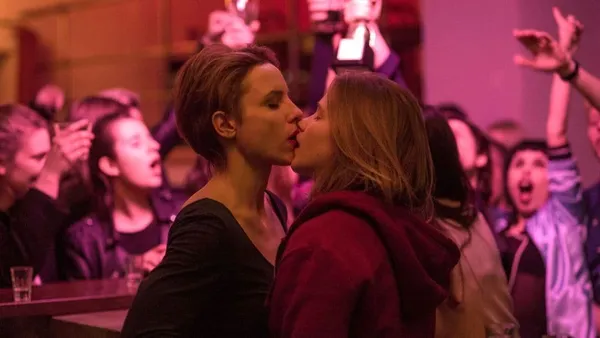Eye For Film >> Movies >> Nina (2018) Film Review
Nina
Reviewed by: Jennie Kermode

Surrogacy is one of those endlessly difficult subjects for policy-makers. When it all goes smoothly it can be a wonderful arrangement, yet if it is licensed and organised, it can have an awful effect on those who become economic conscripts into just about the most personal form of work there is; if it is not licensed and organised, people seeking it are left to blunder around taking chances on personal arrangements in which there's no support network and emotional pressures can lead to crisis. Nina (Julia Kijowska) and Wojtek (Andrzej Konopka) live in Poland, where they are faced with the latter situation. In desperation, they attempt to win over a young woman, Magda (Eliza Rycembel) whom Nina meets by chance.
It's a volatile situation. To understand it fully, one needs to appreciate that the stigma associated with childlessness (and focused almost entirely on women) remains significantly greater in Poland than in many Western countries, and that it is culturally as well as emotionally important to Wojtek to carry on his line. There is also a strong implication that the couple believe having a child will resolve the difficulties in their relationship, which is loving but has somehow lost its spark. This hope is lost, however, and both their worlds turned upside down when Nina unexpectedly falls for Magda.

It's a mutual interest. Though Magda too has a partner (who is often away), there is something between the two women that distorts the fabric of their lives, that shifts everything else out of focus. Director Olga Chajdas (who cut her teeth as assistant director on Agnieska Holland's In Darkness and is the partner of Holland's daughter Kasia Adamik, also a director) keeps the sex scenes between the two to a minimum, in contrast to scenes with Wojtek; the effect is to give the women's relationship a quality that is as much about imagination as it is about the physical. She includes length scenes in which they dance together, blasted by coloured lights, moving through unreal landscapes. The focus is not on their direct interactions but on their desire.
In a society increasingly obsessed by the material, it is too often forgotten that for positive change to be possible, there much first be a dream of something better. What is cinema if not the expression of dreams? The world through which the two women move is not a real one. The openness of the characters (including Wojtek and Nina's sister) to minority sexualities reflects the views of a significant portion of Poland's population, but the clubs, the public spaces in which the free expression of desire between women is permitted, do not yet exist; they reflect Chajdas' hope for Poland's future. It's a hope that seems further away since the election of Andrzej Duda and the country's swing to the right. With Polish feminist groups now extremely concerned about the threat to women's rights, the release of this film could not be more timely.
Ultimately, this film is as much about Nina coming to understand herself fully as a woman and as a whole, independent person as it is about her sexuality. This is paralleled by Magda's struggles with the concept of pregnancy and the loss of autonomy that it represents. in a key scene, the two women visit Natalia Bazowska’s art installation Birth Place, crawling inside the giant, soft sculpture of a womb, discussing their feelings in a way that is wholly feminine yet not in the least passive or gentle. Wojtek, meanwhile, retains sympathy as a man who genuinely seeks to support the woman he loves yet sees his life crumbling and has no clear route to an equivalent form of self-reinvention.
With strong, affecting performances all round, this is an incredibly accomplished first feature. It has intermittent problems with pacing and is probably longer than it needs to be, but it builds to a powerful emotional catharsis that suggests the hoped-for child might always have been a substitute for Nina when the birth she really longed for was her own.
Reviewed on: 12 Jan 2019

















